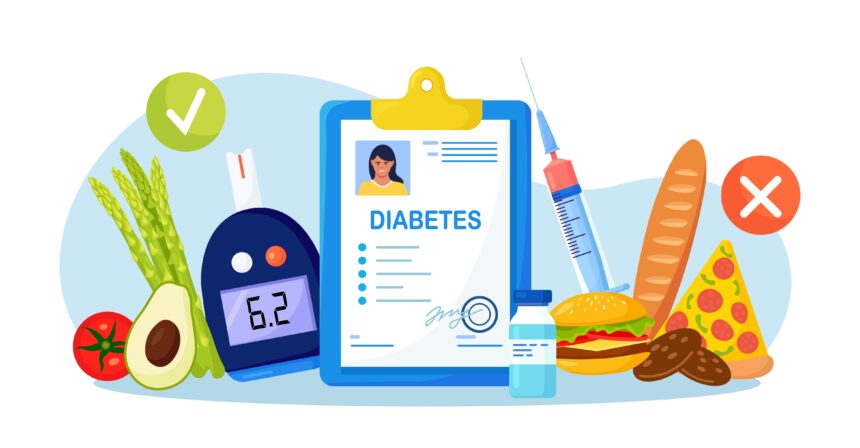There are several misconceptions and misinformation about diabetes on the internet. These myths can keep patients from making healthy eating and lifestyle choices that could help them manage their condition or prevent serious complications.
- What Is Diabetes Diet?
- 8 Diabetes Diet Myths Revealed
- Myth 1: Eating Sugar Causes Diabetes
- Myth 2: Carbohydrates Are The Enemy
- Myth 3: Starchy Foods Are Off-Limits
- Myth 4: You’ll Never Eat Dessert Again
- Myth 5: Artificial Sweeteners Are Safe And Healthy
- Myth 6: Fruit Is Bad
- Myth 7: You Can Eat Anything While On Medication
- Myth 8: Fats Don’t Matter
- Use Klinio App to Get the Right Information about Diabetes
- Conclusion
One of the biggest myths about diabetes is that sugar causes diabetes. While high levels of sugar in the bloodstream increase your risk for diabetes, it is not the main cause. The main cause of diabetes is insulin resistance.
Another myth is that you need to avoid sweets if you have diabetes. While it is true that carbohydrates from desserts can raise blood sugar, they can also be eaten in moderation as part of a well-balanced meal plan.
If you want to know more about the common myths about diabetes, continue reading.
What Is Diabetes Diet?
A diabetes diet is a healthy eating plan that helps you control your blood sugar. It can help you manage your diabetes, lose weight, and prevent or slow the development of diabetes complications.
A healthy diabetes diet is high in fruits, vegetables, and low-fat dairy products. It also includes whole grains, lean protein, and healthy fats. It’s important to follow a healthy diet because it can lower your blood glucose, reduce your risk of developing a diabetic eye disease, and reduce your risk of kidney problems.
Eating right is essential for people with diabetes, but it can be difficult to get started. It is best to start small, such as swapping sugar-sweetened drinks with water.
Portion size is also very important for the success of a diabetes diet. It is recommended to work with a registered dietitian who can create a meal plan that is personalized to your needs and tastes.
8 Diabetes Diet Myths Revealed
There are a lot of myths out there when it comes to diabetes. It can be quite confusing, especially if you’re someone with diabetes. Here are the 8 common myths about diabetes.
Myth 1: Eating Sugar Causes Diabetes
One of the biggest myths about diabetes is that eating sugar causes diabetes. While blood sugar is the major cause of diabetes, eating sugar doesn’t cause it. In most cases, diabetes is the result of your body’s inability to use insulin. Other risk factors are excess weight, age, sedentary lifestyle, high blood pressure, etc. However, the type of sugar you eat plays an important role in your risk of developing diabetes. There are two broad categories of sugars: naturally occurring sugars and processed sugars. It is best to avoid processed sugars if you have diabetes.
Myth 2: Carbohydrates Are The Enemy
Carbohydrates are a type of macronutrient that occurs naturally in fruits, vegetables, grains, and milk. They are not the enemy when it comes to diabetes. It is the quantity and quality of the carb that matters. There are different types of carbs, simple and complex. Simple carbohydrates easily and quickly break down to produce energy. Complex carbs, on the other hand, take time and are high in fiber. Choosing complex carbs over simple ones is the key to a healthy diet.
Myth 3: Starchy Foods Are Off-Limits
When you have diabetes, you need to eat a diet rich in fruit, veggies, and whole grains with a low glycaemic index GI. While most starchy foods raise blood glucose levels, others are safe when eaten in moderation. Simple starches are easily digested and can cause sudden spikes in blood glucose levels. Resistant starch, however, passes through your digestive system slowly and affects blood sugar levels more slowly. This makes it a good option for diabetics who need to regulate their blood sugar.
Myth 4: You’ll Never Eat Dessert Again
If you have diabetes, you need to avoid eating desserts that are high in sugar. However, this doesn’t mean that you won’t be able to eat dessert ever again. You can eat dessert in moderation with a proper diet and exercise plan. First, consider portion size. Instead of a big piece of cake or ice cream, try a small cup of yogurt with strawberries or a handful of nuts. But when you’re mindful about how much you’re consuming, you can eat smaller portions and still get the nutrition you need.
Myth 5: Artificial Sweeteners Are Safe And Healthy
Artificial sweeteners, also called non-nutritive sweeteners, can be found in a wide variety of foods and drinks. You can find them in high-fiber oatmeal, English muffins, canned fruit, yogurt, and some flavored sparkling waters. Even though they may seem safe for diabetics, they are more harmful. According to one study, they can cause weight gain and diabetes. Another concern is that they can lead to glucose intolerance and metabolic syndrome.
Myth 6: Fruit Is Bad
Fruits are a healthy part of the diet and can help with weight loss, lower blood pressure, and reduce your risk for heart disease. However, they are full of sugar, which can be a big concern for those with diabetes and their doctors. That’s why you should pay close attention to the glycemic index of the fruits you eat. Luckily, there are plenty of fruits that have low GI scores and are a great choice for diabetics. Some examples include pears, strawberries, and blueberries.
Myth 7: You Can Eat Anything While On Medication
If your diabetes is managed with medications, that doesn’t mean you can eat anything. You need to be mindful of what you eat. Medicines can interfere with certain foods, and food-drug interactions can be dangerous or even deadly. It’s better to stick to a few healthy and nutrient-dense choices that aren’t too high in sugar, fat, or salt. The best thing to do is ask your doctor or nutritionist for guidance.
Myth 8: Fats Don’t Matter
Fats are essential for nutrient absorption and are an important source of vitamins A, D, E, and K. They also help regulate inflammation and stabilize blood sugar levels. The key is to make sure you get the right types of fats, including those found in cold water fish like salmon, mackerel and sardines, flaxseed, and walnuts. These fats also help reduce triglycerides and lower the risk of heart disease and diabetes.
Use Klinio App to Get the Right Information about Diabetes
Whether you’re newly diagnosed or have been living with diabetes for years, it’s important to get the right information about the condition. You need to know what foods to eat, how much exercise you should be getting, and what medications work best for you.
That’s where the Klinio app can help. Not only does it provide a variety of meal plans and workouts, but it also helps you track your blood glucose levels, weight, steps, and medication.
It’s a good option for anyone who has been recently diagnosed with diabetes or needs an easy way to manage their health. However, it should never replace medical advice.
Conclusion
Diabetes is a common disease that affects millions of people in the United States. It occurs due to a number of factors, including aging, a sedentary lifestyle, and genetics. If left untreated, diabetes can lead to serious health complications. Wrong information about diabetes can stop you from following the right treatment plan. Because of this reason, you need to know about the myths and facts. So, if you have diabetes, make sure to talk with your doctor about what you can do to stay healthy.









